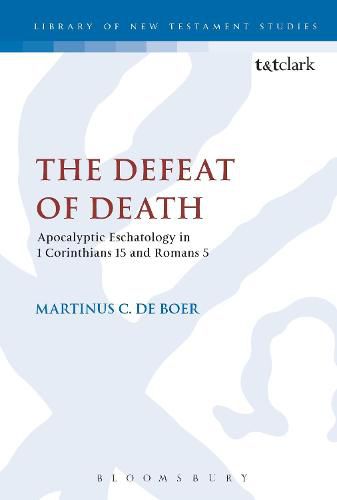Readings Newsletter
Become a Readings Member to make your shopping experience even easier.
Sign in or sign up for free!
You’re not far away from qualifying for FREE standard shipping within Australia
You’ve qualified for FREE standard shipping within Australia
The cart is loading…






Taking the work of Ernst Kasemann and J. Christiaan Beker as a point of departure, Martinus C. de Boer argues that the meaning of ‘death’ in 1 Corinthians 15 and Romans 5 provides the basic clue to any proper definition of Paul’s apocalyptic eschatology. At the same time, he also maintains that Paul’s apocalyptic eschatology, whose point of departure is the crucified and resurrected Christ, provides the basic clue to what ‘death’ means in his theology. A proper definition of Paul’s apocalyptic eschatology in relation to what ‘death’ means for the apostle can in turn help us to understand better the soteriological tension between ‘already’ and ‘not yet’ evident in his thought.
Boer’s work builds on the contributions of other interpreters of Paul, most notably, Albert Schweitzer, Kasemann, J. Louis Martyn, and Beker. Rather than posit some radically new definition of Paul’s apocalyptic eschatology, or attributing to him previously unperceived understandings of ‘death’, Boer instead explores the ways in what Paul says about ‘death’ serves to define his apocalyptic eschatology on the one side, and that his christologically determined apocalyptic eschatology informs his understanding of death on the other.
$9.00 standard shipping within Australia
FREE standard shipping within Australia for orders over $100.00
Express & International shipping calculated at checkout
Taking the work of Ernst Kasemann and J. Christiaan Beker as a point of departure, Martinus C. de Boer argues that the meaning of ‘death’ in 1 Corinthians 15 and Romans 5 provides the basic clue to any proper definition of Paul’s apocalyptic eschatology. At the same time, he also maintains that Paul’s apocalyptic eschatology, whose point of departure is the crucified and resurrected Christ, provides the basic clue to what ‘death’ means in his theology. A proper definition of Paul’s apocalyptic eschatology in relation to what ‘death’ means for the apostle can in turn help us to understand better the soteriological tension between ‘already’ and ‘not yet’ evident in his thought.
Boer’s work builds on the contributions of other interpreters of Paul, most notably, Albert Schweitzer, Kasemann, J. Louis Martyn, and Beker. Rather than posit some radically new definition of Paul’s apocalyptic eschatology, or attributing to him previously unperceived understandings of ‘death’, Boer instead explores the ways in what Paul says about ‘death’ serves to define his apocalyptic eschatology on the one side, and that his christologically determined apocalyptic eschatology informs his understanding of death on the other.